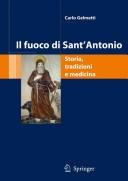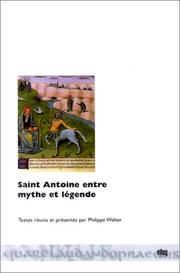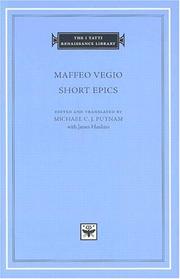| Listing 1 - 5 of 5 |
Sort by
|
Book
ISBN: 9004471863 9004471871 9789004471863 9789004471870 Year: 2022 Publisher: Leiden: Brill,
Abstract | Keywords | Export | Availability | Bookmark
 Loading...
Loading...Choose an application
- Reference Manager
- EndNote
- RefWorks (Direct export to RefWorks)
Saint Antony of Egypt (c. 251-356), often called "the father of monasticism," has numerous representations: the Antony of the Life of Antony and the Letters, but also the Antony of around 120 sayings or apophthegmata. This volume presents fresh English translations of the Greek and Coptic sayings, as well as the first English translation of the Copto-Arabic sayings that are based on unpublished manuscripts. The volume thus opens the door to a richer image of Saint Antony's many identities across various languages and traditions.
Ancient Near East and Egypt Religion --- Biblical Studies --- Christian saints. --- Anthony, --- Saints --- Canonization --- Anbā Anṭūnīyūs, --- Anthony the Abbot, --- Antoine, --- Antoniĭ Velikiĭ, --- Antonio, --- Antonius, --- Antonius Magnus, --- Antony, --- Qiddīs Anṭūnīyūs, --- قديس مصر أنطونيوس --- Anton,

ISBN: 1281343846 9786611343842 8847005957 8847005949 Year: 2007 Publisher: Milano : Springer,
Abstract | Keywords | Export | Availability | Bookmark
 Loading...
Loading...Choose an application
- Reference Manager
- EndNote
- RefWorks (Direct export to RefWorks)
Il libro descrive la storia di Sant'Antonio Abate, il grande taumaturgo ed il fondatore del monachesimo cristiano. Molto prima che ciò fosse una pratica comune tra i fedeli, egli praticò l’ascetismo nel deserto ad imitazione di Cristo e le sue tentazioni demoniache descritte nella biografia scritta da Sant’Atanasio hanno costituito il tema favorito di molti pittori ed ispirato "La Tentation de Saint Antoine" di Gustave Flaubert. Padrone del fuoco e protettore degli animali, viene spesso raffigurato con accanto una fiamma ed un maialino, ragione per cui è anche chiamato "Sant’Antonio del porcello". Egli era il santo prediletto dai contadini ed inoltre patrono dei cestai, dei porcai, dei ceramisti e di molte altre professioni, ma era famoso soprattutto per le sue capacità curative sì da divenire il santo taumaturgo per eccellenza. Pertanto, dal Medio Evo al XIX era invocato per curare le più dolorose piaghe che affliggevano l’umanità, soprattutto quelle più devastanti che furono chiamate "Fuoco di Sant’Antonio". Questo termine includeva molte malattie completamente diverse tra loro, ma che avevano in comune solo un dolore intollerabile. Tra queste, l’ergotismo, l’eresipela e l’herpes zoster sono i tre disturbi più importanti riconosciuti nei secoli. Ancora oggi, in Italia, l’herpes zoster è comunemente chiamato "Fuoco di Sant’Antonio". Di questa affascinante mistura di religione e medicina, di arte e tradizioni si legge in queste righe.
Christian saints --- Anthony, --- Anbā Anṭūnīyūs, --- Anthony the Abbot, --- Antoine, --- Antoniĭ Velikiĭ, --- Antonio, --- Antonius, --- Antonius Magnus, --- Antony, --- Qiddīs Anṭūnīyūs, --- قديس مصر أنطونيوس --- Dermatology. --- History. --- Religion. --- Anthropology. --- History of Science. --- Science, Humanities and Social Sciences, multidisciplinary. --- Religious Studies, general. --- Human beings --- Religion, Primitive --- Atheism --- God --- Irreligion --- Religions --- Theology --- Annals --- Auxiliary sciences of history --- Medicine --- Skin --- Diseases --- Anton, --- Primitive societies --- Social sciences

ISBN: 2843100003 2843103959 9782843100000 Year: 1996 Volume: *2 Publisher: Grenoble: Ellug,
Abstract | Keywords | Export | Availability | Bookmark
 Loading...
Loading...Choose an application
- Reference Manager
- EndNote
- RefWorks (Direct export to RefWorks)
Replacé dans une longue durée de l'imaginaire qui va du IVe siècle - celui d'Athanase qui écrivit la première Vie de saint Antoine - jusqu'à la fin du XVe siècle, avec le Mystère de saint Antoine en Viennois, en passant par les légendes dorées médiévales, saint Antoine l'ermite, « père des moines », révèle un nouveau visage. Le croisement des savoirs, faisant appel à l'anthropologie et au comparatisme, à l'histoire des idées et des croyances religieuses (pour expliquer le symbole du tau ou celui du cochon associés au saint), à l'histoire de l'art enfin (avec le témoignage d'Huysmans sur la représentation picturale des tentations), permet de scruter cette figure-clé de la «mythologie chrétienne». Ainsi, entre légende et mythe peut se définir, autour d'Antoine le mélancolique et l'initié, l'unité d'une tradition culturelle qui, par-delà les siècles et peut-être même les civilisations, fait dialoguer l'Orient et l'Occident, le texte et l'image, l'Antiquité, le Moyen Âge et la Modernité.
Anthony,
---
Athanasius,
---
Antoine,
---
Legends
---
Légendes
---
#BIBC:ruil
Book
ISBN: 884701607X 884705575X 9786613076748 8847016088 1283076748 Year: 2010 Publisher: Italy : Springer,
Abstract | Keywords | Export | Availability | Bookmark
 Loading...
Loading...Choose an application
- Reference Manager
- EndNote
- RefWorks (Direct export to RefWorks)
Il fuoco di Sant’Antonio è una malattia, certo! Ma quale? Per noi Italiani è sicuramente l’Herpes zoster; ma è sempre stato così? Ebbene, no! Sant’Antonio Abate aveva la fama di taumaturgo e guaritore già in vita; così, quando le sue spoglie arrivarono in Europa dopo l’anno Mille, tutti coloro che soffrivano di malattie dolorose e urenti lo imploravano affinché li guarisse da quel “fuoco” che li tormentava. Ma quali erano queste malattie così dolorose? Le antiche cronache sono spesso troppo succinte o romanzate per orientarci nella diagnosi ma erisipela, sifilide, ergotismo hanno fatto certamente buona compagnia allo zoster. L’ergotismo soprattutto era terrorizzante perché compariva a ondate imprevedibili e, come la peste, colpiva i virtuosi come i viziosi, scardinando l’interpretazione del dolore come conseguenza del peccato. Come se non bastasse, l’ergotismo non solo provocava terribili sofferenze ma spesso anche stati di confusione mentale e di delirio sicuramente attribuibili al demonio. Bisogna aspettare l’età dei Lumi per mandare in soffitta le superstizioni che infestavano la medicina e allora l’ergotismo si rivela essere non più una maledizione ma solo una malattia, un effetto del consumo di pane nero alloiato. Lo studio degli allucinogeni e la scoperta dell’LSD mettono la parola fine all’interpretazione mistico-religiosa di alcune patologie e gettano inaspettatamente nuova luce su quello che fu il segreto meglio custodito dell’Antichità: il culto dei Misteri Eleusini. In questo libro, la storia del fuoco di Sant’Antonio si dipana dai racconti medioevali sino all’odierna virologia e suggerisce che la curiosità e la scienza sono l’unico antidoto contro la superstizione e il mistero.
Anthony, -- of Egypt, Saint, -- ca. 250-355 or 6. --- Christian saints -- Egypt -- Biography. --- Electronic books. -- local. --- Ergotism. --- LSD (Drug). --- Shingles (Disease). --- Herpesviridae Infections --- Plant Poisoning --- History --- Mycotoxicosis --- Poisoning --- Humanities --- DNA Virus Infections --- Substance-Related Disorders --- Diseases --- Virus Diseases --- Herpes Zoster --- Ergotism --- History of Medicine --- Medicine --- Health & Biological Sciences --- Dermatology --- Christian saints --- Shingles (Disease) --- LSD (Drug) --- Anthony, --- Ergot --- Saint Anthony's fire --- Acid (Drug) --- Lysergic acid diethylamide --- Lysergide --- Acute posterior ganglionitis --- Ganglionitis, Acute posterior --- Herpes zoster --- Posterior ganglionitis, Acute --- Zona (Disease) --- Zoster (Disease) --- Toxicology --- Anbā Anṭūnīyūs, --- Anthony the Abbot, --- Antoine, --- Antoniĭ Velikiĭ, --- Antonio, --- Antonius, --- Antonius Magnus, --- Antony, --- Qiddīs Anṭūnīyūs, --- قديس مصر أنطونيوس --- Medicine. --- Religion. --- History. --- Science. --- Dermatology. --- Anthropology. --- Medicine & Public Health. --- History of Science. --- Science, general. --- Religious Studies, general. --- Mycotoxicoses --- Diethylamine --- Ergot alkaloids --- Hallucinogenic drugs --- Serotonin --- Herpesvirus diseases --- Antagonists --- Science, Humanities and Social Sciences, multidisciplinary. --- Religion, Primitive --- Atheism --- God --- Irreligion --- Religions --- Theology --- Human beings --- Annals --- Auxiliary sciences of history --- Skin --- Primitive societies --- Social sciences

ISBN: 9780691125374 0691125376 9780674014831 9786612129698 1282129694 1400827426 0674014839 9781400827428 9780691125376 9781282129696 Year: 2006 Volume: 15 Publisher: Princeton, NJ : Princeton University Press,
Abstract | Keywords | Export | Availability | Bookmark
 Loading...
Loading...Choose an application
- Reference Manager
- EndNote
- RefWorks (Direct export to RefWorks)
The lives of Catullus and Horace overlap by a dozen years in the first century BC. Yet, though they are the undisputed masters of the lyric voice in Roman poetry, Horace directly mentions his great predecessor, Catullus, only once, and this reference has often been taken as mocking. In fact, Horace's allusion, far from disparaging Catullus, pays him a discreet compliment by suggesting the challenge that his accomplishment presented to his successors, including Horace himself. In Poetic Interplay, the first book-length study of Catullus's influence on Horace, Michael Putnam shows that the earlier poet was probably the single most important source of inspiration for Horace's Odes, the later author's magnum opus. Except in some half-dozen poems, Catullus is not, technically, writing lyric because his favored meters do not fall into that category. Nonetheless, however disparate their preferred genres and their stylistic usage, Horace found in the poetry of Catullus, whatever its mode of presentation, a constant stimulus for his imagination. And, despite the differences between the two poets, Putnam's close readings reveal that many of Horace's poems echo Catullus verbally, thematically, or both. By illustrating how Horace often found his own voice even as he acknowledged Catullus's genius, Putnam guides us to a deeper appreciation of the earlier poet as well.
Helen of Troy (Greek mythology) in literature. --- Influence (Literary, artistic, etc.). --- Odes, Latin --- Hélène (Mythologie grecque) dans la littérature --- Influence littéraire, artistique, etc. --- Odes latines --- History and criticism. --- Histoire et critique --- Horace --- Catullus, Gaius Valerius --- Virgil --- Knowledge --- Literature. --- Influence. --- In literature. --- Rome --- Rome dans la littérature --- Helen of Troy (Greek mythology) in literature --- Influence (Literary, artistic, etc.) --- Odes --- History and criticism --- Literature --- Influence --- In literature --- Hélène (Mythologie grecque) dans la littérature --- Influence littéraire, artistique, etc. --- Rome dans la littérature --- Artistic impact --- Artistic influence --- Impact (Literary, artistic, etc.) --- Literary impact --- Literary influence --- Literary tradition --- Tradition (Literature) --- Vergil --- Virgile --- Virgilio Máron, Publio --- Virgilius Maro, Publius --- Vergili Maronis, Publius --- Catul --- Catull --- Catulle --- Catulli, C. Valerii --- Catullo, Gaio Valerio --- Catullus, C. Valerius --- Catullus, Gaius Valerius, --- Catullus, Gajus Valerius --- Catulo --- Katull, Gaǐ Valeriǐ --- Katullus, Kaius Valerius --- Valerio Cátulo, Cayo --- Катулл --- Orazio --- Horacij Flakk, Kvint --- Epic poetry, Latin (Medieval and modern) --- Astyanax (Legendary character) --- Jason (Greek mythology) --- Poésie épique latine médiévale et moderne --- Astyanax (Personnage légendaire) --- Enée (Personnage légendaire) --- Jason (Mythologie grecque) --- Vegio, Maffeo, --- Anthony, --- Poésie épique latine médiévale et moderne --- Astyanax (Personnage légendaire) --- Enée (Personnage légendaire) --- Lyric poetry --- Poetry --- Art --- Influence (Psychology) --- Intermediality --- Intertextuality --- Originality in literature --- Helen, --- Elena, --- Helena, --- Helenē, --- Yelena, --- 海伦 , --- ヘレネー, --- הלנה, --- העלענע, --- 헬레네, --- Хелена, --- Єлена, --- Елена , --- هلن, --- هيلين, --- Ἑλένη, --- Aeneas (Legendary character) --- Latin epic poetry, Medieval and modern --- Latin poetry, Medieval and modern --- Scamandrius (Legendary character) --- Legends --- Veggius, Mapheus, --- Vegius, Mapheus, --- Anbā Anṭūnīyūs, --- Anthony the Abbot, --- Antoine, --- Antoniĭ Velikiĭ, --- Antonio, --- Antonius, --- Antonius Magnus, --- Antony, --- Qiddīs Anṭūnīyūs, --- قديس مصر أنطونيوس --- Horatius Flaccus, Quintus --- Vergilius Maro, Publius --- in literature. --- Horatius Flaccus, Q. --- Translations into English. --- Poetry. --- Traductions anglaises --- Poésie --- Virgilius Maro, Publius, --- Virgilio Marone, P., --- Vergilīĭ, --- Virgile, --- Vergílio, --- Wergiliusz, --- Vergilīĭ Maron, P. --- Vergilīĭ Maron, Publīĭ, --- Verhiliĭ Maron, P., --- Vergil, --- Virgilio, --- Virgilīĭ, --- Virgilius Maro, P., --- Virgil Maro, P., --- ווירגיל, --- וירגיליוס, --- ורגיליוס, --- מרו, פובליוס ורגיליוס, --- فرجيل, --- Pseudo-Virgil, --- Pseudo Virgilio, --- Virgilio Marón, Publio, --- Bhārjila, --- Vergilius Maro, P. --- Vergilius --- Virgilio Marone, P. --- Vergilīĭ --- Vergílio --- Wergiliusz --- Vergilīĭ Maron, Publīĭ --- Verhiliĭ Maron, P. --- Virgilio --- Virgilius Maro, P. --- Virgil Maro, P. --- Pseudo-Virgil --- Pseudo Virgilio --- Virgilio Marón, Publio --- Bhārjila --- Catullus, Caius Valerius --- Aeneas --- Jason --- Helen --- Anton, --- Gorat︠s︡īĭ --- Gorat︠s︡iĭ Flakk, Kvint --- Horacij --- Horacio, --- Horacio Flaco, Q. --- Horacjusz --- Horacjusz Flakkus, Kwintus --- Horacy --- Horaṭiyos --- Horaṭiyus --- Horats --- Horaz --- Khorat︠s︡iĭ --- Khorat︠s︡iĭ Flak, Kvint --- Orazio Flacco, Quinto --- הוראציוס --- הורטיוס --- Odes - History and criticism --- Horace - Knowledge - Literature --- Catullus, Gaius Valerius - Influence --- Virgil - In literature --- Rome - In literature --- Marone, Publio Virgilio --- Vegio, Maffeo
| Listing 1 - 5 of 5 |
Sort by
|

 Search
Search Feedback
Feedback About UniCat
About UniCat  Help
Help News
News